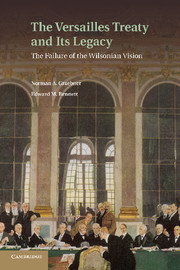Book contents
- Frontmatter
- Contents
- Preface
- 1 The International Order on Trial
- 2 The Road to Paris: 1917???1918
- 3 Versailles: A Study in Arrogance
- 4 The Retreat to Utopia
- 5 Manchuria and the Triumph of Non-Recognition
- 6 The Rise of Hitler
- 7 Challenge of the Dictators
- 8 The Elusive Response
- 9 Munich: The Continuing Escape from Reality
- 10 The Road to Prague
- 11 The Soviet Quest for Collective Security
- 12 The Coming of War: 1939
- Bibliography
- Index
- References
10 - The Road to Prague
Published online by Cambridge University Press: 07 October 2011
- Frontmatter
- Contents
- Preface
- 1 The International Order on Trial
- 2 The Road to Paris: 1917???1918
- 3 Versailles: A Study in Arrogance
- 4 The Retreat to Utopia
- 5 Manchuria and the Triumph of Non-Recognition
- 6 The Rise of Hitler
- 7 Challenge of the Dictators
- 8 The Elusive Response
- 9 Munich: The Continuing Escape from Reality
- 10 The Road to Prague
- 11 The Soviet Quest for Collective Security
- 12 The Coming of War: 1939
- Bibliography
- Index
- References
Summary
I
For Neville Chamberlain, Munich established a new international order that would bring peaceful reconciliation to the major powers of Europe. But realist critics of Munich denied the possibility of a satisfactory outcome. Among them was Winston Churchill, who had attacked British concessions before Munich and was among the first to condemn the Munich agreement itself. He unleashed his verbal attack in the House of Commons: “I shall begin by saying what everybody would like to ignore or forget but which must nevertheless be stated, namely, that we have sustained a total and unmitigated defeat….” In typical Churchillian style, he charged that all Chamberlain had gained for Czechoslovakia was the German dictator, who, “instead of snatching his victuals from the table, had been content to have them served to him course by course.” In the end, he asserted that the British people were misled and not told that their defenses had been sacrificed – and without war. With the “equilibrium of Europe … deranged,” he concluded, the Western democracies were “weighed in the balance and found wanting.”
Perhaps the most devastating condemnation of Chamberlain’s policy came from Third Secretary of the British Embassy in Berlin, Con O’Neill, who resigned in disagreement over what he defined as the disastrous appeasement at Munich. He wrote a lengthy final dispatch to Sir William Strang in the Foreign Office that he hoped would not be construed as presumptuous, coming from a Third Secretary. “But as my reasons for resigning are largely political,” he continued, “I should like to explain why, and on what grounds of observation and anticipation in Germany, I think the policy his Majesty’s Government have followed and, in October at least, seemed likely to continue to follow towards Germany, is mistaken.”
- Type
- Chapter
- Information
- The Versailles Treaty and its LegacyThe Failure of the Wilsonian Vision, pp. 188 - 205Publisher: Cambridge University PressPrint publication year: 2011



